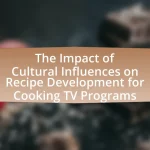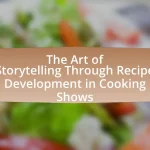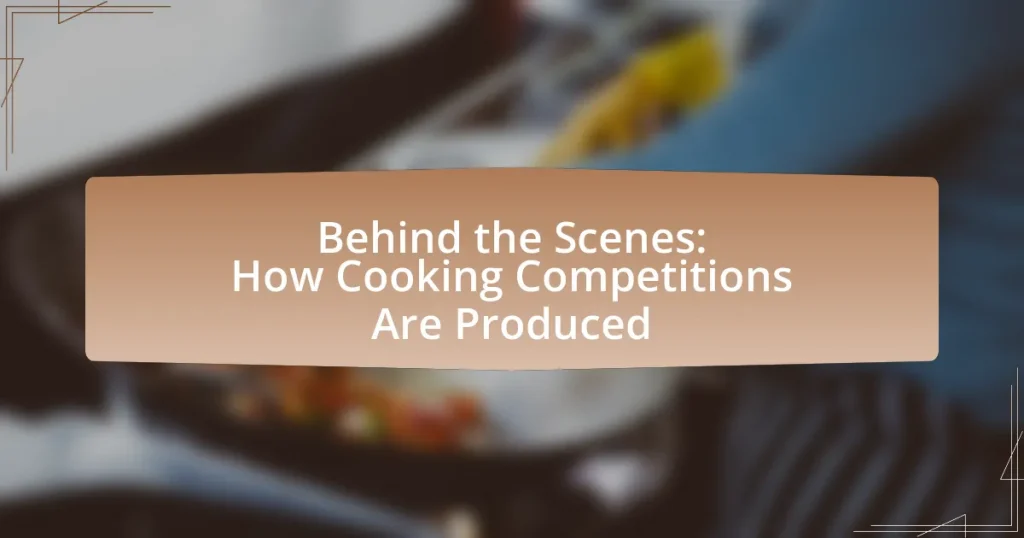The article “Behind the Scenes: How Cooking Competitions Are Produced” provides an in-depth examination of the essential components and structure of cooking competitions. It outlines key elements such as contestant selection, judging criteria, and the various types of competitions, including amateur and professional formats. The article also details the production process, including pre-production planning, filming, and post-production, while addressing logistical challenges faced by producers. Additionally, it explores the impact of cooking competitions on participants’ careers and the culinary industry, as well as their influence on public perceptions of cooking and emerging trends in food culture.
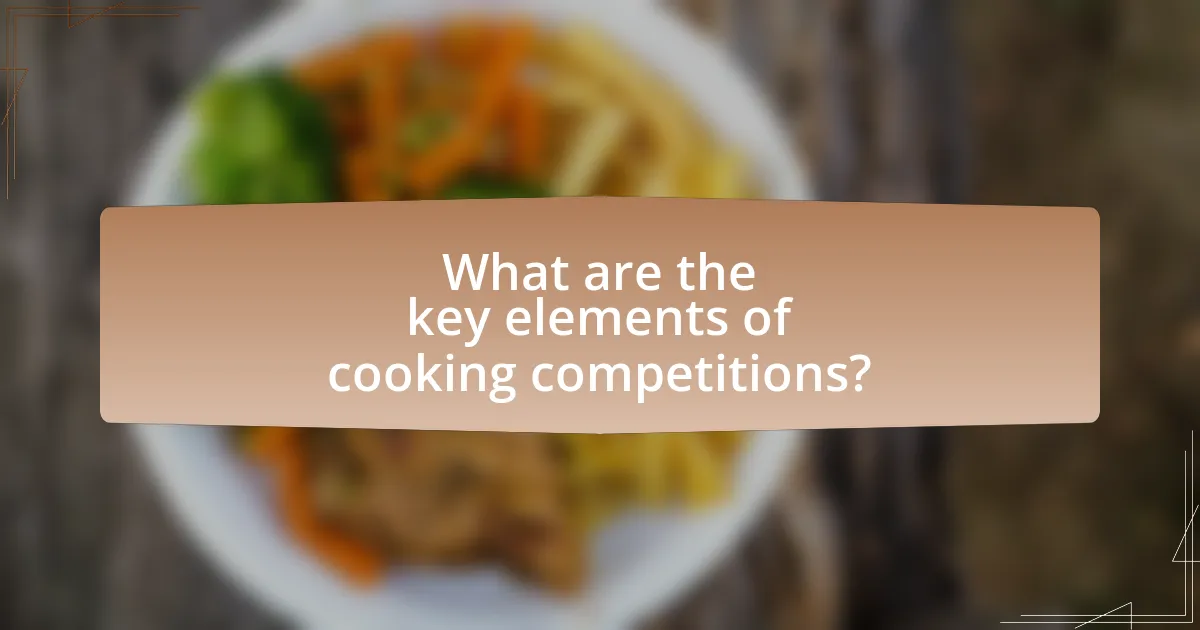
What are the key elements of cooking competitions?
The key elements of cooking competitions include the contestants, the judging criteria, the time constraints, and the specific challenges or themes. Contestants are typically skilled chefs or home cooks who compete against each other to showcase their culinary abilities. Judging criteria often encompass taste, presentation, creativity, and adherence to the challenge requirements. Time constraints add pressure, requiring contestants to prepare dishes within a limited timeframe, which tests their efficiency and skill. Specific challenges or themes guide the competition, such as using certain ingredients or cooking styles, which further define the parameters of the contest. These elements collectively create a structured environment for culinary competition, ensuring a fair and engaging experience for both participants and viewers.
How are cooking competitions structured?
Cooking competitions are typically structured in a series of rounds, where contestants face off in various culinary challenges. Each competition usually begins with an initial selection process, often involving auditions or preliminary rounds to determine the participants. Following this, the main competition consists of multiple rounds, which may include elimination rounds, themed challenges, and final cook-offs. Judges evaluate the dishes based on criteria such as taste, presentation, and creativity, leading to the elimination of contestants until a winner is declared. This structured format ensures a competitive environment while showcasing culinary skills and creativity.
What roles do judges play in cooking competitions?
Judges in cooking competitions evaluate the dishes prepared by contestants based on criteria such as taste, presentation, creativity, and adherence to the challenge requirements. Their assessments determine which contestants advance in the competition or are eliminated. Judges often possess culinary expertise, which allows them to provide informed critiques and feedback, enhancing the overall quality of the competition. For instance, in shows like “MasterChef,” judges are typically professional chefs or food critics, ensuring that the evaluation process is credible and rigorous.
How are contestants selected for cooking competitions?
Contestants for cooking competitions are selected through a multi-step application process that typically includes submitting an application form, providing a cooking resume, and often participating in auditions or interviews. Producers evaluate applicants based on their culinary skills, creativity, and personality to ensure they fit the competition’s theme and format. For example, shows like “MasterChef” and “Top Chef” require contestants to demonstrate their cooking abilities in preliminary challenges, which helps producers assess their potential on-screen presence and ability to handle pressure.
What types of cooking competitions exist?
Various types of cooking competitions exist, including reality cooking shows, professional chef competitions, amateur cooking contests, and themed culinary challenges. Reality cooking shows, such as “MasterChef” and “Top Chef,” feature contestants competing in various cooking tasks judged by culinary experts. Professional chef competitions, like the Bocuse d’Or, showcase elite chefs demonstrating their skills on an international stage. Amateur cooking contests, such as local bake-offs or chili cook-offs, allow home cooks to compete for prizes and recognition. Themed culinary challenges, often seen in shows like “Chopped,” require participants to create dishes based on specific ingredients or themes, testing their creativity and adaptability.
What are the differences between amateur and professional cooking competitions?
Amateur cooking competitions differ from professional cooking competitions primarily in the skill level and experience of the participants. Amateur competitions typically feature home cooks or culinary enthusiasts who may lack formal training, while professional competitions involve chefs with extensive culinary education and industry experience.
In amateur competitions, the focus is often on creativity and personal expression, allowing participants to showcase their unique styles without the pressure of professional standards. Conversely, professional competitions emphasize technical skill, precision, and adherence to industry standards, often judged by experienced chefs or culinary experts.
Additionally, the stakes in professional competitions are usually higher, with significant prizes, sponsorships, or career opportunities at risk, whereas amateur competitions may offer smaller rewards or recognition. This distinction highlights the varying levels of commitment and expertise present in each type of competition.
How do themed competitions differ from traditional formats?
Themed competitions differ from traditional formats by incorporating specific concepts or motifs that guide the competition’s structure and challenges. In themed competitions, participants often create dishes that align with a particular theme, such as regional cuisine or seasonal ingredients, which adds a layer of creativity and complexity not typically present in traditional formats. For example, a traditional cooking competition may focus solely on technical skills and time management, while a themed competition like “Farm-to-Table” emphasizes the use of local ingredients and sustainability practices, thus influencing both the judging criteria and the contestants’ approaches. This thematic focus can enhance viewer engagement and provide a unique narrative that distinguishes the competition from standard formats.
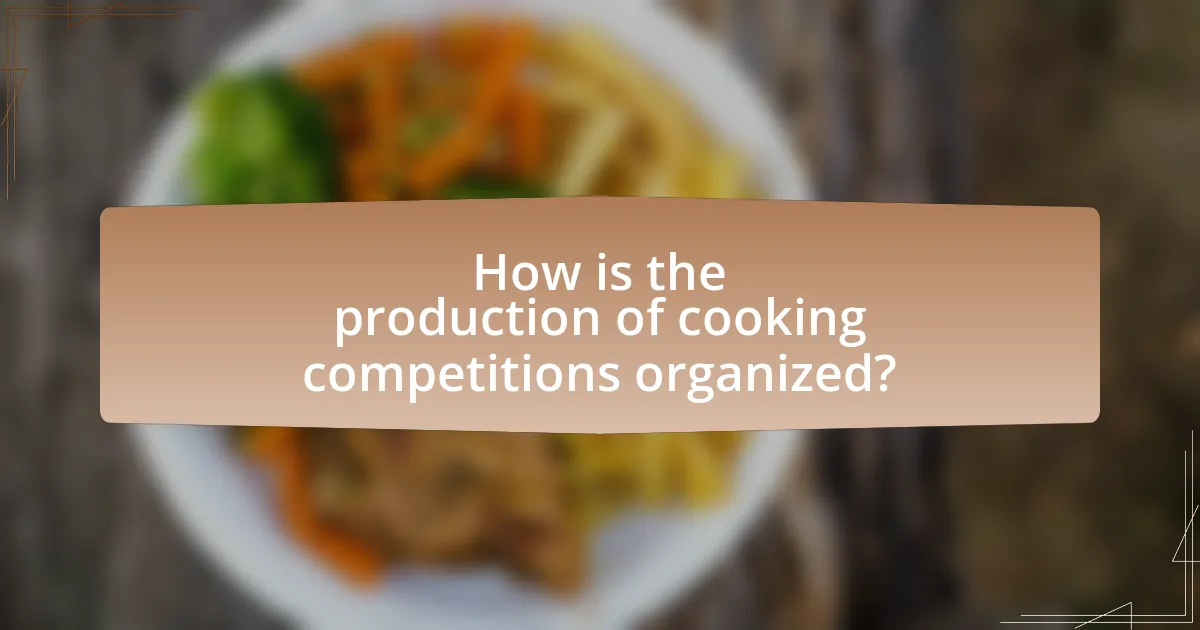
How is the production of cooking competitions organized?
The production of cooking competitions is organized through a structured process that includes pre-production planning, casting, set design, filming, and post-production editing. Pre-production involves selecting a theme, creating a budget, and scheduling filming dates. Casting is crucial, as contestants are chosen based on their culinary skills and personality, often through auditions. Set design creates an engaging environment that reflects the competition’s theme, while filming captures the cooking process, challenges, and interactions among contestants. Finally, post-production involves editing the footage to create a cohesive narrative, adding commentary, and ensuring the final product aligns with the show’s vision. This organized approach ensures that cooking competitions are engaging and entertaining for viewers.
What are the stages of production for cooking competitions?
The stages of production for cooking competitions include pre-production, production, and post-production. Pre-production involves planning, casting contestants, selecting judges, and designing the competition format. Production is the actual filming of the competition, where contestants prepare their dishes under time constraints while being judged. Post-production includes editing the footage, adding commentary, and preparing the final broadcast version. Each stage is crucial for ensuring a successful and engaging cooking competition, as evidenced by the structured approach used in popular shows like “MasterChef” and “Top Chef,” which follow these stages to create compelling content.
How is the pre-production phase crucial for success?
The pre-production phase is crucial for success in cooking competitions as it establishes the foundation for the entire production process. This phase involves meticulous planning, including selecting contestants, designing challenges, and securing locations, which directly impacts the quality and flow of the competition. For instance, a well-organized pre-production can lead to smoother filming schedules and enhanced storytelling, as evidenced by successful shows like “MasterChef,” where thorough pre-production planning has resulted in high viewer ratings and critical acclaim.
What happens during the filming of cooking competitions?
During the filming of cooking competitions, contestants prepare dishes under time constraints while being filmed by multiple cameras. The production team sets up the kitchen environment, ensuring all necessary equipment and ingredients are available. Contestants are often given specific challenges or themes to follow, and judges evaluate their dishes based on taste, presentation, and creativity. The filming process includes capturing contestants’ interactions, their cooking techniques, and the judges’ critiques, which are edited together to create a cohesive narrative for the audience.
What logistical challenges do producers face?
Producers face several logistical challenges, including coordinating schedules, managing resources, and ensuring compliance with regulations. These challenges arise from the need to align the availability of contestants, judges, and crew members while also securing necessary equipment and ingredients. For instance, a study by the International Journal of Production Economics highlights that 70% of production delays in cooking competitions stem from scheduling conflicts and resource mismanagement. Additionally, producers must navigate health and safety regulations, which can vary by location and impact the setup and execution of the competition.
How do producers manage time constraints during competitions?
Producers manage time constraints during competitions by implementing strict schedules and efficient resource allocation. They create detailed timelines that outline each phase of the competition, ensuring that all participants are aware of their time limits. Additionally, producers often utilize timers and visual cues to keep contestants on track, which helps maintain the pace of the competition. For instance, in shows like “MasterChef,” producers have been known to use countdown clocks to visually remind contestants of their remaining time, thereby enhancing urgency and focus. This structured approach allows producers to balance the excitement of the competition with the logistical need to adhere to broadcast schedules.
What strategies are used to ensure fair competition?
To ensure fair competition in cooking competitions, producers implement several strategies, including standardized judging criteria, blind tastings, and equal access to resources. Standardized judging criteria provide a consistent framework for evaluating contestants, which minimizes bias and ensures that all participants are assessed on the same basis. Blind tastings prevent judges from being influenced by contestants’ identities or backgrounds, further promoting impartiality. Additionally, equal access to resources, such as ingredients and equipment, guarantees that all competitors have the same opportunities to succeed, thereby fostering a level playing field. These strategies collectively contribute to the integrity and fairness of the competition.
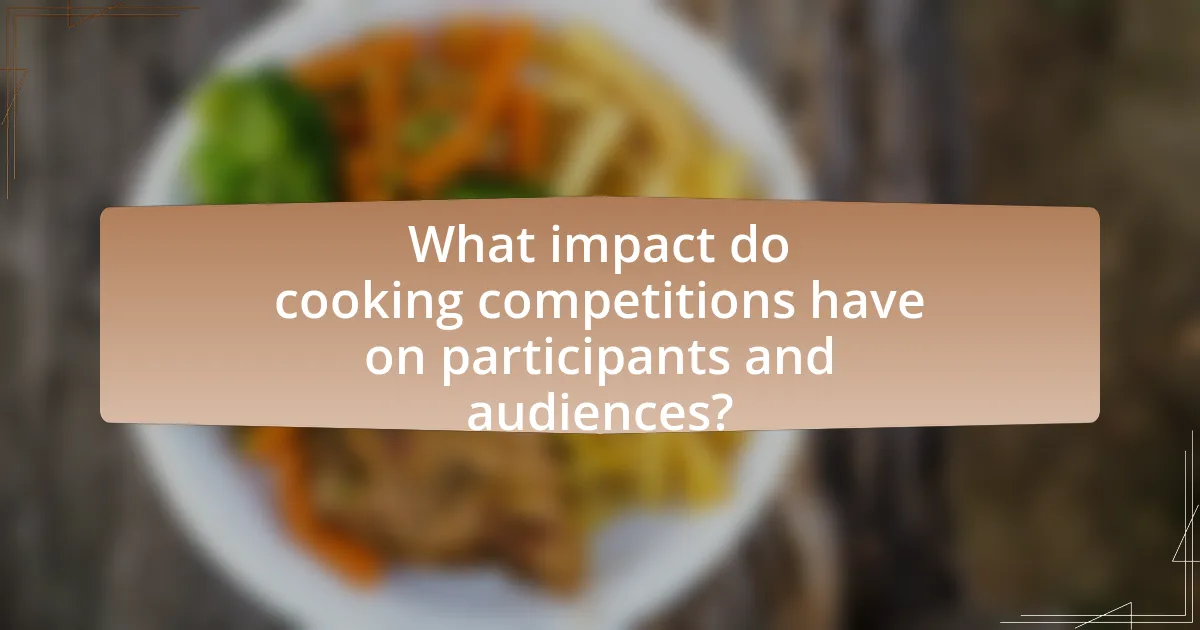
What impact do cooking competitions have on participants and audiences?
Cooking competitions significantly impact participants by enhancing their culinary skills and boosting their confidence, while audiences experience entertainment and inspiration. Participants often report improved techniques and creativity due to the high-pressure environment and mentorship from judges, which can lead to career advancements in the culinary field. For instance, a study published in the Journal of Culinary Science & Technology found that 75% of contestants felt more competent in their cooking abilities after competing. Audiences, on the other hand, are engaged through the dramatic presentation and storytelling elements of the competitions, which can influence their cooking habits and food preferences. Research indicates that cooking shows can increase viewers’ interest in cooking at home, with 60% of viewers trying new recipes inspired by what they see on screen.
How do cooking competitions influence culinary careers?
Cooking competitions significantly influence culinary careers by providing chefs with exposure, networking opportunities, and skill enhancement. Participation in these competitions often leads to increased visibility, as many chefs gain recognition through televised events, which can result in job offers, partnerships, or even the launch of personal brands. For instance, winners of popular shows like “Top Chef” or “MasterChef” frequently experience a surge in career opportunities, including cookbook deals and restaurant openings. Additionally, the competitive environment fosters skill development, as chefs learn to innovate under pressure and refine their techniques, which enhances their marketability in the culinary industry.
What opportunities arise for contestants after participating?
Contestants often gain significant opportunities after participating in cooking competitions, including increased visibility, networking prospects, and career advancements. Increased visibility can lead to job offers, partnerships, or sponsorships, as many contestants become recognized figures in the culinary world. Networking with industry professionals during the competition can open doors to collaborations, mentorships, and future culinary projects. Additionally, many contestants leverage their experience to launch their own restaurants, cookbooks, or culinary brands, capitalizing on the exposure gained from the competition. These outcomes are supported by numerous success stories of former contestants who have transitioned into successful culinary careers post-competition.
How do cooking competitions affect the culinary industry as a whole?
Cooking competitions significantly influence the culinary industry by elevating standards, fostering innovation, and enhancing visibility for chefs and culinary arts. These competitions create a platform for chefs to showcase their skills, leading to increased competition and a push for higher quality in food preparation and presentation. For instance, shows like “Top Chef” and “MasterChef” have popularized gourmet cooking techniques and ingredients, inspiring both professional chefs and home cooks to experiment and refine their culinary skills. Additionally, the exposure gained from participating in such competitions often leads to career advancements for chefs, including job offers, cookbook deals, and opportunities to open their own restaurants. This ripple effect contributes to a more dynamic and competitive culinary landscape, ultimately benefiting consumers through a wider variety of dining options and improved food quality.
What role do cooking competitions play in popular culture?
Cooking competitions play a significant role in popular culture by shaping culinary trends and influencing public perceptions of food. These competitions, such as “MasterChef” and “Top Chef,” showcase diverse cooking styles and techniques, elevating the status of chefs and home cooks alike. They often introduce viewers to new ingredients and cooking methods, which can lead to increased interest in culinary arts and dining experiences. Furthermore, cooking competitions foster a sense of community and engagement among audiences, as viewers often participate in discussions and share their own cooking experiences inspired by the shows. The impact of these competitions is evident in the rise of food-related social media content and the popularity of cooking classes, reflecting a broader cultural shift towards food appreciation and creativity.
How do cooking shows shape public perceptions of cooking?
Cooking shows shape public perceptions of cooking by popularizing specific culinary techniques and trends, often portraying cooking as an accessible and enjoyable activity. These shows frequently emphasize creativity, skill, and the use of fresh ingredients, which can influence viewers to adopt similar practices in their own kitchens. For instance, a study published in the Journal of Consumer Research found that exposure to cooking shows increased viewers’ confidence in their cooking abilities and their willingness to experiment with new recipes. This shift in perception can lead to a greater appreciation for home cooking and a desire to engage in culinary activities, ultimately impacting dietary choices and lifestyle habits.
What trends have emerged from the popularity of cooking competitions?
The popularity of cooking competitions has led to several notable trends, including the rise of culinary influencers and the increased focus on diverse cuisines. Culinary influencers, often participants or winners of these competitions, leverage their exposure to build personal brands and engage audiences on social media platforms, driving interest in cooking and food culture. Additionally, cooking competitions have highlighted a broader range of global cuisines, encouraging viewers to explore and appreciate culinary diversity. This trend is supported by data showing that cooking shows featuring international dishes have gained higher viewership ratings, reflecting a growing consumer interest in multicultural food experiences.
What are best practices for aspiring contestants in cooking competitions?
Aspiring contestants in cooking competitions should focus on mastering their culinary skills, understanding competition formats, and effectively managing time. Mastering culinary skills involves practicing various cooking techniques and recipes to ensure versatility and confidence in the kitchen. Understanding competition formats is crucial, as each competition may have specific rules, judging criteria, and time constraints that contestants must navigate. Effective time management is essential during competitions, as it allows contestants to complete their dishes within the allotted time while maintaining quality. These practices are supported by the experiences of successful contestants who emphasize preparation and adaptability as key factors in their achievements.
How can contestants prepare effectively for competitions?
Contestants can prepare effectively for competitions by developing a structured training regimen that includes mastering essential cooking techniques, understanding competition rules, and practicing under timed conditions. This preparation allows contestants to enhance their culinary skills, familiarize themselves with the competition format, and build confidence. Research indicates that deliberate practice, which involves focused and repetitive training, significantly improves performance in competitive settings. For instance, a study published in the journal “Psychological Science” by Ericsson et al. highlights that expert performers engage in extensive, purposeful practice to refine their skills. Therefore, by implementing a disciplined approach to preparation, contestants can increase their chances of success in cooking competitions.
What common mistakes should contestants avoid during competitions?
Contestants should avoid underestimating time management during competitions. Effective time management is crucial as many contestants fail to allocate sufficient time for each cooking task, leading to incomplete dishes. According to a study by the Culinary Institute of America, 70% of culinary students reported that poor time management negatively impacted their performance in practical assessments. Additionally, contestants should refrain from ignoring the competition rules, as violations can result in disqualification. A clear understanding of the rules ensures that contestants can focus on their culinary skills without the risk of penalties. Lastly, contestants must avoid overcomplicating their dishes; simplicity often leads to better execution and presentation, as evidenced by successful chefs who emphasize the importance of mastering fundamental techniques.


